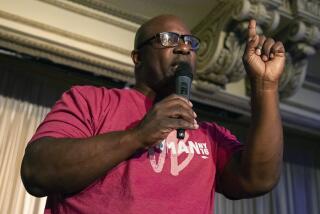NEWS ANALYSIS : 3-Way Dynamic of Race Assures Uncertainty
- Share via
WASHINGTON — On the morning after Patrick J. Buchanan’s stunning victory in New Hampshire, Bob Dole and Lamar Alexander each were quick to claim that the Republican presidential race had been reduced to a two-man contest between himself and the combative conservative columnist.
Buchanan himself resisted that interpretation, suggesting in a television interview that Dole, Alexander and Steve Forbes were all still viable candidates.
Buchanan’s comments revealed a keen sense of the situation in which he finds himself as the campaign hurtles forward. For now, his interests are served by maintaining a crowded field of candidates who both bleed away Dole’s strength and divide the votes of moderates.
By contrast, both Alexander and Dole are convinced that they can beat Buchanan one on one--if they can first force the other from the field. Thus, each is eager to convince voters, the press and fund-raisers that they offer the best prospect of stopping Buchanan.
These contrasting strategic calculations reflect the triangular nature of the race that emerged out of the initial contests in Iowa and New Hampshire. Dole, in effect, has been fighting two battles: one against Buchanan for the votes of conservatives, the other against Alexander, Forbes and Indiana Sen. Richard G. Lugar for the support of moderates.
Only by sapping Dole’s strength on both sides have Alexander and Buchanan been able to bring the Senate majority leader within reach. And both Alexander and Buchanan are standing on the shoulders of Forbes, whose millions of dollars in negative advertising through the winter weakened Dole’s standing.
For both Alexander and Buchanan, the best hope for swiping the nomination is that together they can topple Dole before he can bring to bear his financial and organizational advantages against one of them alone.
Dole hopes to break out of this vise by portraying Buchanan as too extreme and Alexander as too liberal--thus widening the space in the center for himself. “One candidate we need to push out to the right, and one we need to push out to the left,” said Warren Tompkins, a South Carolina-based political strategist directing Dole’s effort across the South.
‘Tag-Team Wrestling’
Some analysts can foresee the three-way dynamic defining the race for weeks--with Alexander and Buchanan tacitly dividing their efforts to challenge Dole in different states, and even Forbes remaining a factor in selected contests. “It’s like tag-team wrestling,” said Bill Lacy, Dole’s deputy campaign chairman.
But many believe that a three-man race, like any menage a trois, is inherently unstable. By that theory, there is not enough money, press attention and voter interest to sustain three candidates in the field for long.
With Buchanan’s committed base of support and low-budget guerrilla campaign style virtually guaranteeing him a place in the final rounds, the next two weeks could amount to a struggle between Dole and Alexander to emerge as the alternative.
Dole begins that contest with substantial financial and organizational advantages--but, after his defeat Tuesday, he is burdened by growing doubts about his appeal.
So far, the three-way race has magnified Dole’s vulnerabilities--and masked the weaknesses of Buchanan and Alexander.
Buchanan has benefited from the race’s fractured nature because it has diminished the impact of his greatest liability: a polarizing message that alienates as many Republicans as it excites. Because Buchanan has such high negative ratings even among GOP primary voters, many analysts believe he has a relatively low ceiling on potential support. But New Hampshire and Iowa both show that as long as the total vote is being sliced into many pieces, Buchanan can remain competitive.
Splitting Moderates
Buchanan disputes the notion of a low ceiling of support. But he acknowledges that, for now, his interests are best served by keeping other candidates in the race. “I would certainly encourage Steve Forbes to stay on,” Buchanan said with a laugh before Tuesday’s New Hampshire result was known. “He has a wonderful, strong, positive message. Lamar as well. But you don’t want him to get too strong. You have to do this just right.”
Alexander’s situation is the reverse: He appears to need Buchanan in the race to prevent conservative votes from flocking to Dole.
Alexander’s appeal to conservatives in the first two races has been anemic: The former Tennessee governor attracted only about 15% of conservatives in both Iowa and New Hampshire, according to exit polls of voters. Alexander drew even fewer votes from “born-again” Christians.
That poor performance could become a greater problem for Alexander as the primary schedule moves South. Alexander has staked many of his hopes on scoring well in South Carolina on March 2 and Georgia three days later. But both states have electorates in which conservatives--and religious conservatives in particular--play a large role.
Just 1 in 10 New Hampshire voters were religious conservatives; in South Carolina and Georgia, the figure is likely to be at least 1 in 3. That mix should benefit Buchanan, who so far has amassed substantial margins among religious conservative voters in the first states.
Alexander’s aides remain optimistic they can find a niche in these first two critical Southern tests. Their target is baby-boomer suburban voters less focused on social issues and attracted to Alexander’s emphasis on education. “You’ve got the only Southerner in the race heading into two states . . . inclined to vote for a fellow Southerner,” says Whit Ayres, Alexander’s pollster.
But even in a three-way squeeze, Alexander will have to run better with conservative voters than he has so far to score well. And to sustain his fund-raising, he probably has to break through with a victory somewhere by early next month. Given the ideological profile emerging for his candidacy, he may find more fertile ground in the moderate New England states that vote on March 5--including Massachusetts and Connecticut--than the South.
“Lamar has to win someplace and soon,” said Charles Black, the chief strategist for Texas Sen. Phil Gramm’s failed campaign. “If you run third every week, pretty soon you spin out.”
No Core of Support
If the three-way race has tended to cloak the weaknesses of Buchanan and Alexander, it has highlighted Dole’s greatest vulnerability: the absence of a committed core of support. In the first contests, Dole’s support has been broad but thin. In both Iowa and New Hampshire, he attracted support roughly evenly from moderates and conservatives--but not enough from either group to pull past his rivals.
As Black notes, Dole appears to be the only candidate acceptable to all elements of the party. But he adds, “Dole doesn’t generate intensity with any group.”
* CLINTON REACTION: White House sees Buchanan victory as a win-win. A10
* RELATED COVERAGE: A3, A5
More to Read
Get the L.A. Times Politics newsletter
Deeply reported insights into legislation, politics and policy from Sacramento, Washington and beyond. In your inbox three times per week.
You may occasionally receive promotional content from the Los Angeles Times.










